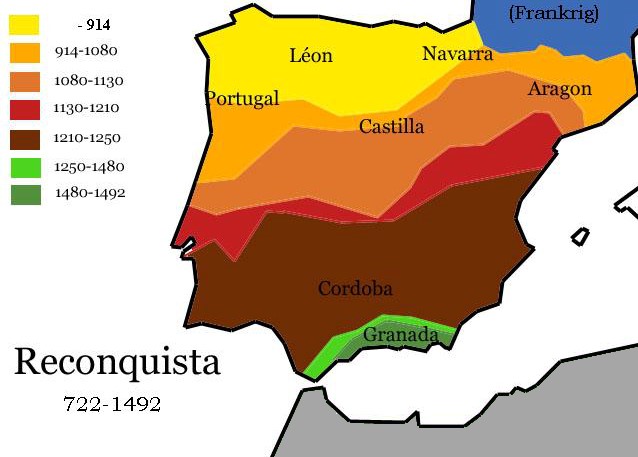
Reconquista
The Reconquista, was an extremely long campaign of Re-conquering Iberia from the islamic states that had taken it over hundreds of years prior, and kept it for almost 500-800 years (Depending on which source, although most say around 700) and I must be honest, the Reconquista campaign did not show mercy, the Christian states in Iberia used all they could muster to attack the Muslim’s and it definitely succeeded. However, some consequences were not only Spain expelling Muslims, but Jews and people who were atheists/agnostics as well, (as they wanted to maintain control, and those beliefs didn’t align with the Catholic Church.)

And, back to the point, the Reconquista lasted from 722-1492, with it ending January 2nd, 1492 (March 31st 1492 is when they expelled Jews and most irreligious people, they had been expelling Muslims for a long time.) for some extra context, just months later, Christopher Colombus would establish the first Spanish Colonies in the new world. And I guess I’ll put info from the reconquista’s battles here too, such as The Battle of Las Navas de Tolosa was a decisive crusader victory, with the Crusaders launching a surprise assault against the Almohad Caliphate, with the latter taking around 10x as many casualties as the crusaders. Refer to the map for the size of the Caliphate compared to the Spanish states.

In this crucial battle, Alfonso crossed the mountain range that defended the Almohad camp, which took the Caliphs by surprise, as they got absolutely destroyed, and this is widely regarded as the most influential battle of the Reconquista.
Alfonso I for reference.
Another battle, The Battle of Río Salado was a major Crusader victory. During the battle; The esteemed council of war resolved that His Majesty the Castilian King would launch an assault upon the Sultan's principal host, whilst the valiant Portuguese contingent, augmented by thrice one thousand stalwart Castilians, would confront Yusuf I. At the stroke of nine on the morn of the thirtieth day of October in the year of 1340, they departed their encampment, leaving in their stead two thousand untrained militia to maintain its guard.

(Map of the nations for reference)
The formidable Castilian vanguard was commanded by the illustrious Lara brethren, whilst His Majesty himself rode within the main formation. To the left, the missile troops from the Kingdom of León were led by the esteemed Pedro Nuñez, while to the right, Alvar Pérez de Guzmán commanded a noble cavalry contingent. Furthermore, the valiant forces of Portugal were bolstered by the esteemed Military Orders of Alcántara and Calatrava. Abu Hasan had departed from the Jara crossing unchallenged, yet he arrayed formidable legions along the Salado. The vanguard of Castile encountered formidable opposition; de Lara found himself unable to traverse the shallow waters of the river. Nevertheless, the King's progeny, Fernando and Fadrique, commanded an 800-knight contingent to the right, seizing a modest bridge and repelling the 2,500 cavalry stationed for its defense. Alfonso didst augment their ranks with an additional 1,500 knights, thereby ensuring the successful passage of the Salado. At the heart of the tumult, Juan Núñez de Lara, alongside the illustrious Military Order of Santiago, with a valiant legion of 3,000 knights, at long last pierced the adversarial line and ascended the hill, where the encampment of Abu Hasan lay distinctly within their sight.
Simultaneously, the forces concealed in Tarifa besieged the Sultan's camp; the defenders, comprising approximately 3,000 cavalry and 8,000 infantry, yielded, with half retreating towards Algeciras whilst the remainder joined the principal conflict within the valley, where the Sultan's army remained, for the most part, unscathed. Alfonso, alas, discovered himself perilously alone, with the right flank stationed at a considerable distance whilst the vanguard besieged the enemy encampment. Abu Hasan commanded a universal onslaught, and the Castilian monarch was poised to engage in martial strife when the esteemed Archbishop of Toledo, Gil Álvarez Carrillo de Albornoz, seized his reins and thwarted his intent. The fortuitous arrival of the Castilian rear guard restored equilibrium to the fray, and as those marauding the Sultan's camp descended the hillside to assail the foe from behind, Abu Hasan's beleaguered host succumbed and retreated towards Algeciras. In the interim, the valiant forces of Portugal did traverse the Río Salado, and upon the reinforcement provided by the noble Pedro Nuñez, the entire contingent of Granada did falter and abandon the field of battle.
The conflict endured a mere span of three hours, commencing at the ninth hour and concluding at midday. The relentless pursuit undertaken by the noble Castilians and valiant Portuguese against the Muslim factions was most merciless, culminating at the banks of the Guadamecí River, a mere six kilometers hence from the theatre of conflict. Yet, many remained entrenched within the hills, plundering the opulent encampment of the Sultan. One may speak of scant mercy displayed in this endeavor, for many of the Sultan's esteemed wives met their demise, including his principal consort Fatimah, daughter of the Sultan of Tunis, alongside the noble Aysa, offspring of the esteemed Abu Yahya ibn Yaqub. Moreover, several kin of Abu Hasan were taken captive, such as his sister Umalfat, his son Abu Umar Tasufin, and his nephew Alí. A multitude of distinguished personages fell in battle or during the chaotic retreat, including the esteemed Abu Tabit ibn Fath Allah, the gallant Abu Muyahid Gazi ibn al-Ka's, and the renowned scribe from Granada, Abdullah ben Salmun, alongside the illustrious imam Ibn al-Khatib. Both the esteemed Abu Hasan and the noble Yusuf arrived at Algeciras; the Sultan sought sanctuary at Gibraltar, and upon that very night, traversed to Ceuta aboard a regal galley.
Conclusion: The Reconquista is extremely complex, and long, if I had the time to make a book on it I would, however I’ll conclude it here, the two battles I wrote about were considered the two most influential of it, with that said, Alfonso I was probably the best monarch ever, anyways ¡Hasta luego!